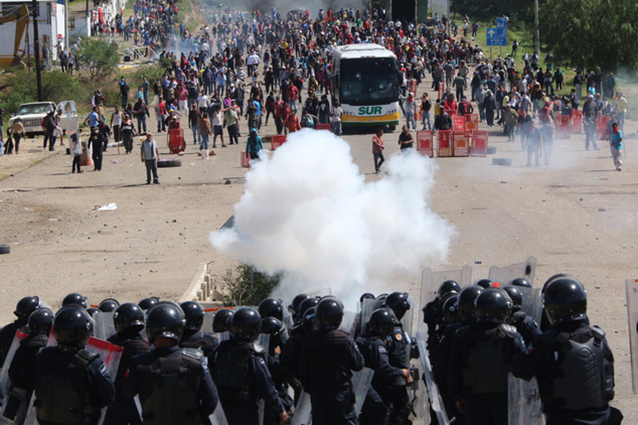from the Bureau of the Fourth International
June 22, 2016
Since the Mexican government passed an alleged “educational reform”–actually a reform that profoundly affects working conditions, attacks job security and the rights of unions to organise in the sector–through Congress, education workers have maintained strong resistance.
The government of Peña Nieto tried to break the resistance of workers in education, especially teachers, in several ways. One was to compel teachers to undergo an educational assessment, which is a punitive measure and would result in the dismissal of those who do not succeed. The review is built on the basis of market criteria in line with the logic of privatization developed on all fronts by the neoliberal governments that have succeeded in Mexico.
The review takes no account of regional and cultural specificities. It claims on the contrary to standardize education by eliminating these regional differences. This type of evaluation particularly affects teachers in indigenous communities where the need is not to speak English as well as Spanish but rather the local language. This standardized evaluation is therefore discriminatory and serves as a pretext to fire teachers who supposedly would not pass the exam.
The movement against the education reform has refused to submit to these assessment exams despite threats of dismissal against those who refused to comply.

Teachers face off with the police in Oaxaca.
The government is refusing any dialogue with the opposition movement and is carrying out repression. Opposition to the reform is involving ever wider sectors of teachers but finds its main expression in the National Coordination of Education Workers (CNTE) with a strong presence in the states of Oaxaca, Guerrero, Chiapas, and Michoacán. In other states of the republic, the opposition is organized by other union currents.
In recent weeks, government repression has increased, including through sacking or by stopping the pay of thousands of education workers in the country, who refused to submit to the evaluation exam or who participated in a strike movement organized by their local union. More recently, the government arrested union leaders, not only during repression against particular protests, but also by issuing arrest warrants against them and taking them from their homes. Some have been transferred to detention centres far away from where they work or live. This is the case for the Secretary General of Section 22 of Oaxaca, Rubén Nuñez, who was arrested and transferred to a federal prison in the remote state of Sonora, in the north.
The most serious repressive episode took place this weekend, when thousands of agents of the Federal Police attacked several places in the state of Oaxaca simultaneously where there were demonstrations and road blockades organized by social movements. On Sunday 19 June, dozens were injured and at least six people were shot dead in the attacks.
Recently, the movement expanded to include parents of students who started organizing to support the struggle of teachers. The repression affected both the teachers’ movement as such and the organized sectors of the people, mainly parents of students in solidarity with their children’s teachers. The situation is very serious, and at this time, the repression is spreading to other parts of the country. On Monday in Mexico City police attacked a rally of solidarity with Oaxaca.
It is urgent to stop the repression and support the fight against the alleged “education reform.” The government claims to be ready to have discussions with the movement provided that it accepts its “educational reform.” This is obviously nonsense since it is precisely opposition to this reform that teachers want to discuss. In fact, the only option left to teachers by the government is that of capitulation and unconditional acceptance of reform.
At the moment, international solidarity with the movement of teachers is fundamental, as it was a few months ago for the movement in Ayotzinapa fighting for the 43 students still missing. In this regard, we must remember that these 43 students were in training in a school in Ayotzinapa that prepare teachers for education in rural and indigenous areas. This is the type of school which is clearly in the sights of this “educational reform” that wants to standardize education based on the criteria of capitalist efficiency.
The movement of international solidarity with the struggles of the Mexican people should be deployed through a range of actions: statements, rallies in front of consulates and embassies, demonstrations against visits by Peña Nieto abroad. We must show the world that the teachers and the Mexican people are not alone in this struggle and the end to repression and the release of new political prisoners, activists and trade union leaders who oppose the “education reform “is an international requirement.
This statement was translated into English and adopted by the Bureau of the Fourth International at its June 20, 2016 meeting.
